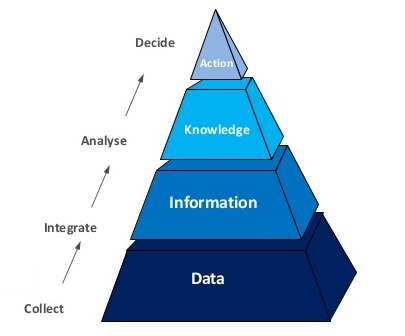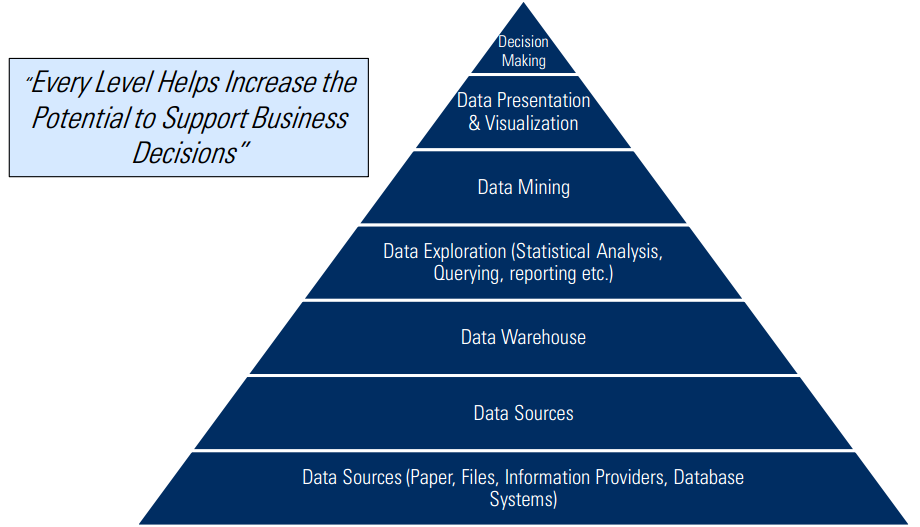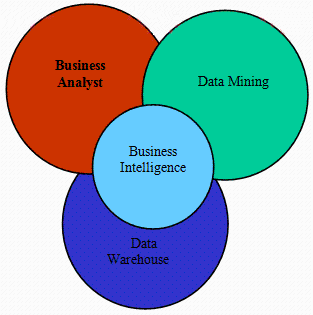What is Business Intelligence?
There are many definitions of BI as below, each definition raises a prominent characteristic of BI yet the general rules are all mentioned the possibility of helping to make efficiency decision of BI.
1. What is Business Intelligence?
- Business Intelligence (BI) refers to skills, processes, technologies, applications and practices used to support decision making.
- Business intelligence- BI is the set of techniques and tools for the transformation of raw data into meaningful and useful information for business Analysis purposes
- BI is the applications and technologies transforming Business Data into Action.
Or:
- BI is the new technology for understanding the past & predicting the future.

Castoffs:
BI is a process and technology that enterprises use to control the huge number of data, mining data to make the decision- making more efficient in their business activity. BI technology provides an overview on activities of enterprises from the past, present to future predictions. The target of BI is to help enterprises make better decision. Therefore, BI system is also known as Decision Support System (DSS)
2. BI System
The illustration below describes a "Smart business process".

The key aspect of BI is Data Warehouse and Data Mining since data in BI is synthesized data. Data Warehouse is characterized by various sources and formats, and it is clustering and historical. Besides, analyzing data in BI is not simple (query, Filtering), but it uses Data Mining technique to do classification, clustering, or prediction. Thus, BI has a very tight relationship with Data Warehouse and Data mining.
A simple BI system can be viewed as a combination of three main components as follows:

- Data Warehouse: contains comprehensive data of the firm
- Data Mining: includes techniques to exploit data and discover information like Classification, Clustering, Association Rule, and Prediction.
- Business Analyst: Leaders of enterprises make strategic decisions on activities of the firm.
3. What are the benefits of BI?
BI increases the ability to control information of enterprise accurately, efficiently which can analyze, explore intellectual can help business predict the trend of services price, customer behavior and detect potential clients to set out suitable strategies to increase business competitiveness.
BI helps businesses use information effectively and accurately to adapt to constantly changing environment and intense competition in the business.
Making business decisions in an effective and efficient way
- Identify the position and strength of the firm
- Analyze customer behavior
- Identify objectives and strategy of Marketing
- Forecast the future of the firm
- Draw up business strategy
- Keep lucrative customers and predict potential customers
4. Technologies supporting for BI
- Data warehousing
- Enterprise resource planning (ERP) systems
- Query and report writing technologies
- Data mining and analytics tools
- Decision support systems
- Customer relation management
Although we call Business Intelligence (BI), the definition and qualifications of BI can be used for almost all socioeconomic organizations such as Education, Government, health care, and so on.
BI Activities
- Decision support
- Query and reporting
- Online analytical processing (OLAP)
- Statistical analysis
- Forecasting
- Data mining.
5. BI for whom? (BI Users)
Many users be able to benefit from BI
- Executives
- Business Decision Makers
- Customers
- Analysts
Oracle APEX Tutorials
- What is Oracle Application Express?
- Install Oracle Apex 5.0
- Install Oracle REST Data Services (ORDS) for Oracle APEX
- Oracle APEX Tutorial for Beginners (APEX 5.0)
- Oracle APEX Tabular Form Tutorial with Examples
- Oracle APEX Master Details Tutorial with Examples
- Custom Authentication in Oracle APEX
- Oracle APEX Dynamic Action Tutorial with Examples
- Create Dynamic Content Region in Oracle APEX (PL/SQL Dynamic Content)
- What is Business Intelligence?
- Install Oracle BI 11g
Show More